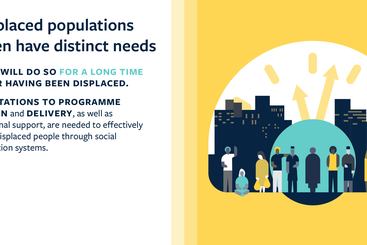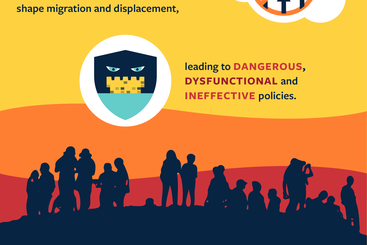Reflections on the World Bank's World Development Report (WDR) on Migrants, Refugees, and Societies and key considerations for its implementation.
While the UK Home Secretary fears that net migration may reach one million this year, Britain is actually grappling with long-standing labour shortages. Sectors including transport, agriculture and healthcare – impacted by Brexit, the Covid-19 pandemic, and the Government’s hard-line stance on migration, continue to make the headlines. Policy responses to date, such as training and incentives for British workers and seasonal working contracts have proven insufficient. Amid much uncertainty, it’s clear that the size and shape of the UK's workforce will continue to suffer without recognition of the need for migration, and political incentive to maximise its benefits.
What role will the World Bank play in migration management?
Continued global economic imbalances, diverging demographic trends, and climate breakdown mean that migration - in all its forms - is only set to grow as a key development policy area. So, it’s in the World Bank’s interest to ensure it is managed effectively, for secure, stable economies, and the safe movement of people and goods.
The recently published World Development Report (WDR) on Migrants, Refugees, and Societies is indicative of the Bank’s approach and ambitions in this area; offering a policy framework based on labour economics and international law to maximize the net gains of human mobility. The framework is based on a ‘match and motive matrix’, where ‘match’ refers to the extent to which the skills and attributes of refugees and other migrants respond to the needs of destination countries, while ‘motive’ relates to the reasons behind their movement.
The framework explicitly acknowledges that refugees and other migrants have an array of skills, which can ‘serve as a force for growth and shared prosperity in all countries’ and invites countries to better target specific groups of migrants and allow them to successfully integrate in the host society.
A valuable emphasis on the agency of people
The point that migration is good for the economy is nothing new. Migrant workers are essential to our economies and societies. Making up around 15% of the essential workforce across the EU, their crucial role was highlighted in the response to the COVID-19 pandemic. But at a time where the (often deep) politicisation of migration management poses a major barrier to smart, safe policies – and continues to breach human rights across the world - this is a welcome step forward to shift the narrative and approach to global migration.
By putting refugees and other migrants at the centre of the proposed framework, they are recognised as agents of development. This is in itself ground-breaking, perhaps not as a concept but certainly as an acknowledgement. Many immigration agendas that focus on labour – such as the UK’s Global Talent Scheme or points-based system for skilled workers - often exclude those who do not meet the skills or salary threshold. Importantly, this framework considers all migrants, including refugees, forcibly displaced, or irregular migrants, not as helpless victims - or unworthy of national protection and support - but valuable members of society, in countries of origin and destination.
The risk of focusing on the economic value of people
Yet, one might question whether it is fair to assess migrants and refugees according to the contribution they can make to their country of destination, when citizens of the European Union Member States enjoy freedom of movement across 27 countries with no reason required, and for as long as they please.
Besides the particular case of Britain, EU citizens’ mobility rarely makes it to the headlines due to its ease, openness, and normality. Additionally, EU migrants enjoy a life free from the traumatic limitations to movement imposed by work visas, and exercise what should be everyone’s right, such as moving to a different country to live with family and friends.
The benefits of such migration can be measured in economic terms, like the enhanced skills and employability of EU migrants who improve their work experience in one country and put it to use in another. Though in reality, these contributions go far beyond economics, including contribitions culture, innovation and knowledge exchange, to name a few.
How to ensure the benefits of migration are gained and distributed more fairly?
The WDR is a stepping stone to the development of fairer and more effective policies that can benefit refugees, other migrants, and both their country of origin and destination. When it comes to its implementation, the following considerations would ensure the benefits of migration are gained and distributed more fairly.
1. Beyond skills and motives, centre migrants’ preferences and aspirations
The reasons behind why and how people move are complex. In many cases, migration journeys and preferences are influenced by (often longstanding) diaspora networks, international relations and power asymmetries. Support networks, shared languages, religious and cultural beliefs, as well as the impact of emigration itself and perceptions of place, can influence the preferred destinations of (potential) migrants. A rights-based approach, placing the empowerment and meaningful participation of migrants in decision-making processes that affect them and their families, should be central to the implementation of this framework.
2. Encourage decision-makers to align policies on migration with public attitudes
ODI work has shown that UK public attitudes towards refugees and other migrants are often much more tolerant, balanced, and positive than politicians’ speeches or news headlines. What’s more, policies that emphasise the economic value of migration already have widespread public support. For instance, 81% of the British public are in favour of allowing asylum seekers to work six months into their application process, instead of the current 12. Increasingly tolerant attitudes were also identified in several European countries, mismatching the outright hostility of national policies, which are often grounded on false assumptions of migrants’ motivations, goals and decision-making processes.
3. Bring sociology and psychology into the policy-making process
Policies on paper differ from their actual implementation, and ODI work has shown that they do not necessarily reach their target audience or affect the target audience’s behaviour in the way it was intended. A case in point: while the overarching narrative of migration policy often focuses on migration management and development of legal migration channels (as per the Global Compact of Migration), the way these policies are implemented shows that their main goal is migration prevention. In order to understand and act upon the limits of migration policy, more attention needs to be directed towards migration decision-making, and especially to the subjective and intangible factors that have so far been sidelined.
4. Foster meaningful global cooperation
While low- to middle-income countries of origin bear the brunt of training young people and experiencing 'brain drain', as pointed out in the WDR, this has little influence in the international fora where migration policies are developed. Further, while the WDR does a good job of underlying the need to protect refugees and uphold international standards, it is much less clear about responses to ‘distressed’ (or, irregular) migrants. It acknowledes only in passing that the conditions under which migrants are considered irregular are often created by the very countries of destination. The World Bank’s global reach, financial strength and newly integrated vision mean it could be well positioned to rectify such power imbalances. Countries of origin, destination and migrants must be involved in the policy-making process, with their priorities and concerns centred.
5. Finally, alongside labour mobility must come labour protection
As noted in the WDR, formal access to the labour market leads to better outcomes for migrants. In practice, this means a strong regulatory system needs to be in place to ensure labour and human rights protection in all destination states, safe recruitment, decent and varied employment options and access to social protection provisions – even for short-term arrangements such as seasonal work. Reticent policy makers should be reminded that, in turn, better protected workforces mean greater net benefits of migration, including taxes for host countries and greater remittances for countries of origin.
The 2023 WDR shows clearer than ever that migration can be a win for countries of origin and of destination alike, but only when it is also a win for migrants can we ensure that the full potential of human mobility is reached.





